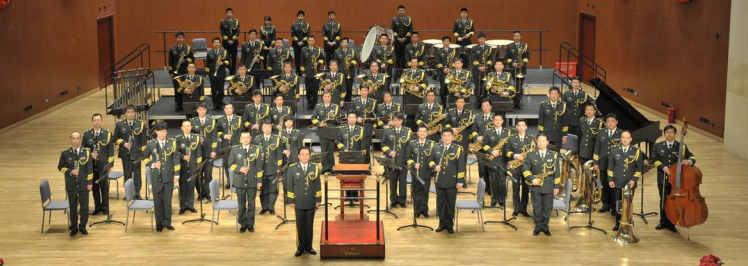
The People's Liberation Army Band
During U.S. Defense Secretary Robert Gates’ visit to China in January, Beijing heralded his arrival with the first public flight of its J-20 stealth fighter. Tonight, in honor of the arrival of General Chen Bingde, chief of staff of China’s People’s Liberation Army, the U.S. will return the favor: with a joint concert featuring the People’s Liberation Army and the U.S. Army Concert bands in Washington.
OK. So it’s not the Beatles battling the Stones, nor even Woodstock. Heck, some folks say “military music” itself is a contradiction in terms. But the news that the PLA band has finally hit the big-time — a gig in America! — is big news back home.
“On Monday night, the two military bands will make history by premiering their joint performance at the John F. Kennedy Center for the Performing Arts in Washington, DC,” the China Daily newspaper reported Monday. “Entitled Friendship and Cooperation Through Music, the joint performance has been hailed as a breakthrough as the PLA Military Band makes its maiden official trip to the United States.”
The concert — as well as dates in Philadelphia on Thursday and New York on Saturday, including one at Lincoln Center (sorry: sold out…even though the tickets are free…but SROs remain a possibility!) stems from a decade-ling friendship between Senior Colonel Yu Hai, conductor of the PLA band and Colonel Thomas Rotondi Jr., conductor of Pershing’s Own, the U.S. Army Band.
The China Daily piece continues:
China’s reform and opening-up has opened up opportunities for Chinese band musicians to change their views about brass bands. “For a long time, we believed that brass bands play only marches and ceremonial music,” Yu tells China Daily.
Military musicians make up one of those strange communities inside the military, along with chaplains, medical personnel, lawyers and public-affairs officers that stand apart from the fighting forces (with notable exceptions, like battlefield medics). But they do a lot to generate esprit de corps: anyone who has ever witnessed a good military band on a parade ground knows that. But they also are controversial: Gates has brandished military bands in his efforts to boost funding for the State Department. Former secretary of state “Condi Rice used to say we have more people in military bands than they have in the (6,000-strong) Foreign Service,” he noted last year. “She was not far wrong.”
“What is really important about this exchange is that we exchange music from different cultures,” Rotondi tells China Daily. “By exchanging music from different countries, we get to understand different cultures better.” The U.S. Army’s China Desk Officer concurs. “These types of events build trust and help build relationships,” Major Kevin Koerner says.
According to Army officials, two of the four concerts this week (Monday’s at the Kennedy Center and Saturday for the U.N. General Assembly) will be private, akin to hiring Sir Elton John to play at your daughter’s bat mitzvah. Each 65-member band will play a handful selections by itself, and then join together for several pieces. The first U.S. piece is The Star-Spangled Banner, followed by some Sousa, Bernstein and Gillespie. The PLA band, after playing its national anthem, will open with Ambush, a symphonic poem by Chen Qian intended “to praise and ask for the happiness of heroes and martyrs.” (Having traveled the world with various U.S. officials, it can be painful, if touching, to hear a foreign ensemble grapple with the U.S. national anthem.) Expected combined encores include Ode to Motherland and The Stars and Stripes Forever.


